Does pasta have folic acid?
- What is Folic Acid?
- The History of Folic Acid Fortification in America
- Why Should You Care About Folic Acid?
- What is the MTHFR gene ?
- The Importance of the Methylation Process
- How does folic acid affect the methylation process?
- How does folic acid affect those with the MTHFR gene?
- Why folic acid can lead to bloating and other symptoms
- How do you know you possibly have the MTHFR gene mutation ?
- How to combat this?
- Individual Differences: Why One Size Does Not Fit All
- Finding Non-Enriched, Folic Acid-Free Pasta
- Conclusion
- FAQs
- References
How often do you look forward to a good bowl of pasta and instead of feeling satiated you feel disappointment, discomfort, and bloating afterwards?
Truly, the saddest feeling as one simply wants to enjoy their food. We should feel as light as a pillow, not as heavy as a rock after eating our favorite foods right?

If so, it is not just you, many people are experiencing bloating and discomfort after eating certain foods, and one of these foods is pasta.
The enjoyment of pasta, a staple in many diets, comes with layers of complexity beyond its taste.
This is because, yes, all enriched grains, including pasta, in the U.S. are fortified with folic acid, and this has been in practice since the late 1990’s as stated in this (research article).
The practice of fortifying foods with synthetic folic acid, though rooted in preventive health measures, brings to light the diverse ways our bodies respond to these additions.
This scenario underscores the importance of being informed and making dietary choices that resonate with our unique health needs, guiding us towards options that harmonize with our personal wellness journey.
Understanding the implications of consuming foods fortified with synthetic folic acid is crucial, especially for those with specific genetic predispositions.
This issue calls for a closer examination of our dietary choices and a shift towards more natural, nutrient-rich alternatives.
Health-conscious individuals are increasingly questioning the impact of these additives on their well-being, and pushing towards a dietary change and a return to wholesomeness of unenriched, traditional foods.
If you are seeking to avoid certain ingredients like folic acid and enrichment in foods and want to know more about this process, check out our enriched vs unenriched blog for a thorough understanding of this!
In the end, this journey is about us moving away from foods with man-made artificial substances and avoiding foods with folic acid.

We all need to be more and more vigilant about the foods we are consuming, and we all need to be advocates towards our own healthcare.
It is a tough ride, but it is worth it as our bodies are temples and temples deserve the best!
What is Folic Acid?
In our journey towards understanding and avoiding certain foods better, a crucial step is distinguishing between the nutrients that nature offers and those that are man-made.
Folic acid, a synthetic form of vitamin B9 found in supplements and fortified foods, stands in contrast to the naturally occurring folates found in whole foods like leafy greens.
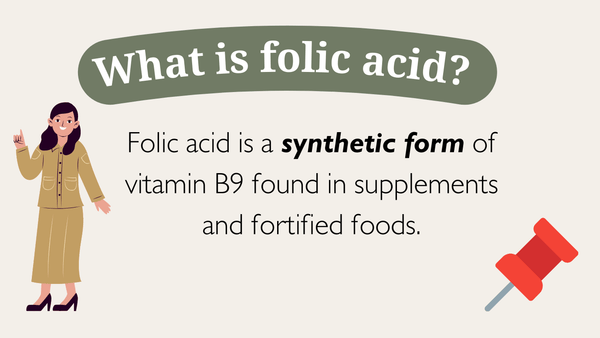
Folic acid doesn't exist in nature; it's a product of scientific innovation, designed to enhance the nutritional value of our food supply.
This distinction matters greatly because our bodies interact differently with folic acid compared to natural folates.

While folic acid is added to prevent nutritional deficiencies, its synthetic nature means it might not be as easily utilized for some of us with certain genes.
One gene of interest is the MTHFR gene mutation, which is more commonly found in individuals of Italian, Hispanic, and Chinese descent.
The effects of folic acid on those with this gene mutation can in turn affect the process of producing methylfolate (the most prevalent form of folate in our circulation).
Methylfolate needs to be readily available for our bodies use and metabolized optimally as it is necessary for many bodily functions in which we will dive into later.
On the other hand, natural folates not only are more readily utilized but also come packed with additional beneficial nutrients.

You may hear a lot that “100% of folic acid is absorbed”, but we really need to be asking ourselves, “Yes, but is it being utilized not just absorbed”?
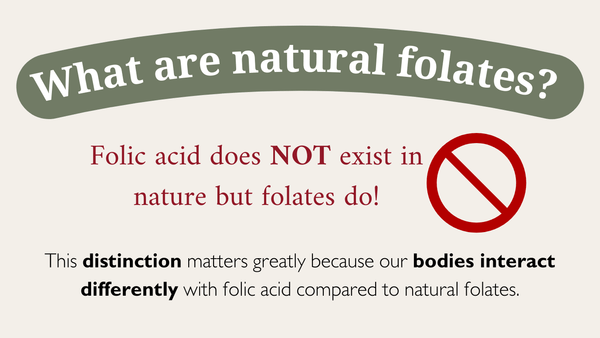
The widespread use of folic acid in the standard American diet, particularly since the 1990s, was a well-intentioned effort to address people with folate deficiency.
However, this approach has nuanced implications, especially for individuals with certain genetic variations affecting how folic acid is metabolized.
Understanding this distinction empowers us to make informed dietary choices, leaning towards foods that align with our body's natural needs and avoiding foods that do not.
The History of Folic Acid Fortification in America
The story of folic acid fortification in the United States is a fascinating journey of public health, innovation, and unintended consequences.
It begins with a noble intention: to prevent major birth defects such as spina bifida and anencephaly, which research linked to folate deficiencies.
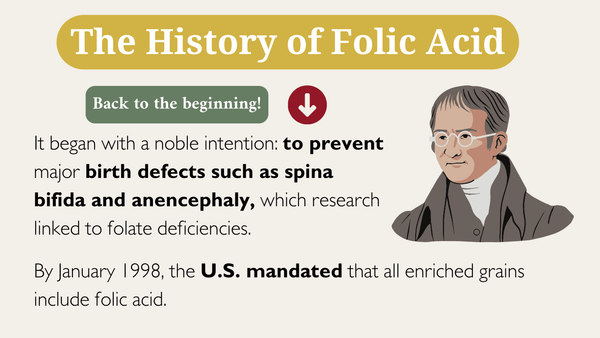
This journey was inspired by early studies, including a pivotal one in Atlanta in 1988, which showed that folic acid could significantly reduce the risk of neural tube defects.
The narrative gained momentum with further research, including Sir Nicholas Wald’s 1991 study in the UK, revealing folic acid’s potential to prevent a substantial percentage of these birth defects.
This led to the first CDC recommendation in 1991, urging women to consume folic acid before and during the early stages of pregnancy.
By January 1998, the U.S. mandated that all enriched grains include folic acid (source).
This initiative was met with success, reducing neural tube defects by about 15%. However, policy also introduced challenges, particularly for individuals with the MTHFR gene mutation, affecting their ability to metabolize synthetic folic acid effectively.
We will get into this gene and its implications later in the blog!
While folic acid fortification aimed to address deficiencies and reduce birth defects, it also raised concerns about its potential health implications for a significant portion of the population.
This story underscores the complexity of public health initiatives and the importance of personalized nutrition strategies.
It’s a reminder that while advancements in food science can bring significant benefits, they also come with the need for careful consideration of individual health needs and genetic variations.
Why Should You Care About Folic Acid?
Understanding folic acid is crucial because it highlights a broader issue in nutrition and health: not all interventions are universally beneficial.
Even though it was introduced to combat deficiencies and led to some notable changes, it has also inadvertently caused harmful effects.
Now that time has passed and the process of food enrichment has evolved, we have found out this one-size-fits-all solution overlooked individual genetic differences, such as the MTHFR gene mutation, which affects a person's ability to process synthetic folic acid.
This gene variation means that for some, consuming fortified foods can lead to health challenges instead of benefits.

It can lead to bloating, pain, hyperactivity, and even anxiety when eating pastas that are fortified or when eating any enriched grains.
With that said if you have experienced bloating after eating certain foods, then you might have this gene variation.
Additionally and according to research, folic acid has even been shown to affect neurotransmitters, DNA replication, mood, cardiovascular health and SO MUCH more that we will discuss later.

If this is you or not, it's a call to pay closer attention to the ingredients in our food and their impact on our health, especially for those navigating the complexities of food sensitivities and genetic predispositions.
What is the MTHFR gene ?
The MTHFR gene plays a crucial role in our bodies, acting like a detailed instruction manual for producing an essential substance called methylfolate.
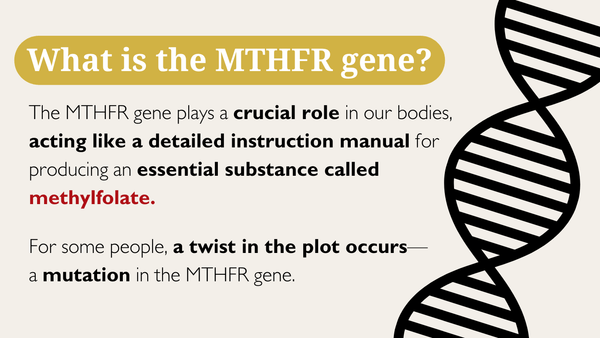
Methylfolate is a natural form of folate, which our bodies use seamlessly for a variety of critical functions, from supporting our mood and energy levels to helping create new cells.
For some people, a twist in the plot occurs—a mutation in the MTHFR gene.
Imagine you're following a well-known recipe but suddenly find the instructions slightly altered. This mutation tweaks the body's recipe for using folate effectively.
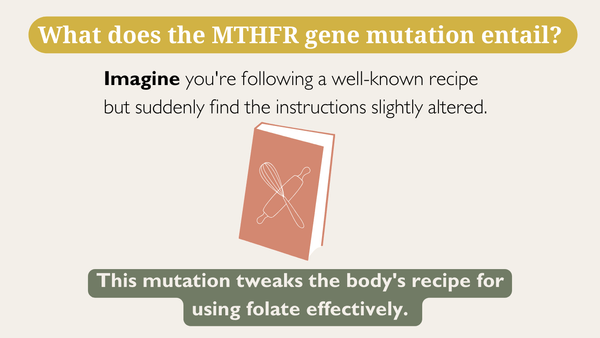
It doesn't mean the body stops cooking; it just struggles to convert folic acid into the readily usable form, methylfolate, efficiently.
This can lead to a domino effect, subtly influencing everything from how we feel daily to our overall physical health.
Think of it this way: if your body were a complex, bustling city, the MTHFR gene mutation might be likened to a key bridge being out of service.
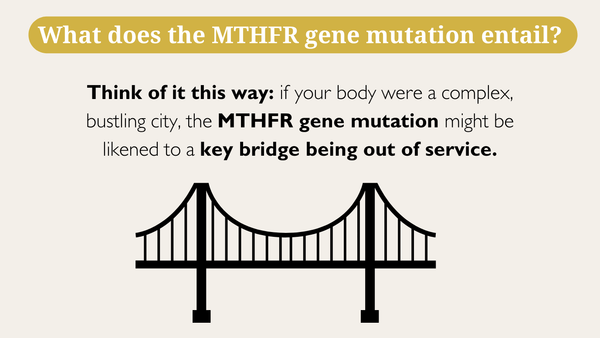
Traffic (in this case, vital bodily processes) doesn't stop, but it certainly slows down, leading to detours (health challenges) that affect the city's (body's) efficiency and well-being.

For those with the mutation, it's as though their body's inherent ability to thrive on certain nutrients hits a roadblock, making the journey toward health a bit more challenging but not impossible.
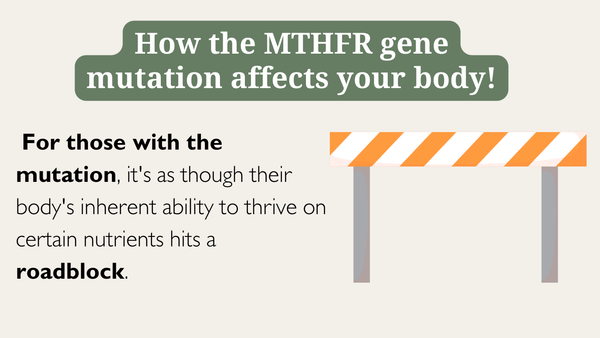
This simple shift in our genetic makeup can profoundly affect how we absorb and utilize essential nutrients, reminding us of the intricate relationship between our bodies and the foods we eat.
Understanding this relationship is the first step toward nurturing our well-being and mpowering us with the knowledge to choose foods that support our unique genetic blueprint.
The Importance of the Methylation Process
Imagine a bustling city at the heart of your body, where the methylation process is the infrastructure that keeps everything running smoothly.
This isn't just any process; it's the master controller behind the scenes, ensuring that your body's vital functions, like DNA repair, energy production, and mood regulation, perform harmoniously.
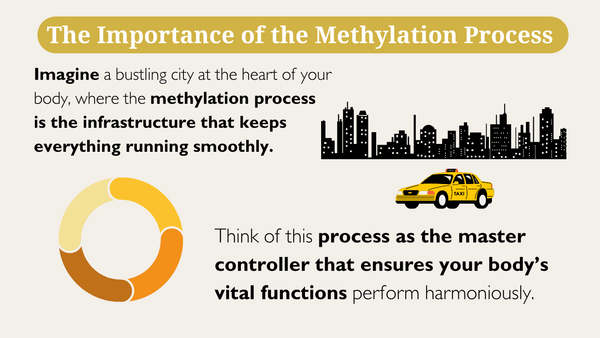
In this city, methylfolate plays the role of the essential worker, actively participating in the methylation cycle.
This cycle is like the city's power grid, distributing energy and resources where they're needed most, from synthesizing your DNA to managing the neurotransmitters that dictate your mood and thoughts.
However, when high levels of folic acid enter the system, it's akin to a storm disrupting the city's power supply.
The research in the study high folic acid consumption leads to pseudo MTHFR deficiency, underscores how excessive folic acid intake can lead to a bottleneck effect in the production of S-adenosylmethionine (SAM), the body's principal methyl donor (research article).
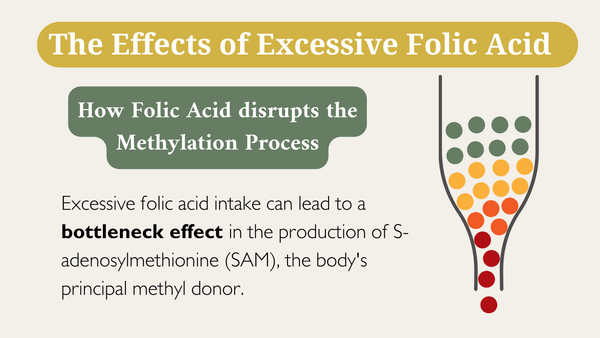
Imagine SAM as the currency of the methylation city, fueling every transaction and process.
With its levels diminished, the city's operations - gene expression, neurotransmitter balance, and even the cleaning up of homocysteine, a potential toxin, are thrown into disarray.
This disruption is not just about a minor inconvenience.
It can lead to significant health challenges, such as altered liver function and lipid metabolism, painting a vivid picture of the cascading effects when the methylation process is compromised.
The narrative of high folic acid consumption serves as a cautionary tale, highlighting the delicate balance required to maintain our biological city's health and vitality.
Understanding the critical role of the methylation process reminds us of the importance of choosing foods that support, rather than disrupt, this vital biological infrastructure.
How does folic acid affect the methylation process?
Building on the vivid city metaphor we've just navigated through, let's zoom in on a particular scene: the impact of folic acid on this bustling metropolis.
Think of folic acid as a foreign investor pouring funds into the city.
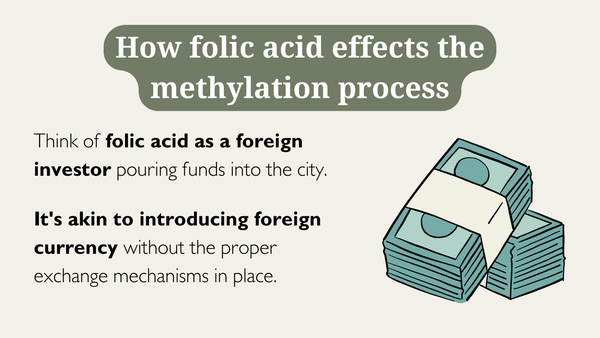
At first glance, this influx seems beneficial, promising to boost the city's economy (our body's methylation process).
However, there's a catch that's not immediately apparent.
Folic acid, while seemingly beneficial, operates differently from the city's native currency, methylfolate. It's akin to introducing foreign currency without the proper exchange mechanisms in place.
For individuals with variations in the MTHFR gene, this scenario becomes even more complex.
Their system, or city's financial institutions, can't efficiently convert this foreign investment into usable currency, leading to a series of unintended economic (biological) consequences.
Here, the effects become twofold:
1. Disruption of Methylfolate Production: Folic acid begins to crowd the city's infrastructure, taking up space and resources that would otherwise be used to produce and distribute methylfolate, the city's own thriving currency.
This is akin to a traffic jam caused by too many foreign vehicles on the road, preventing the smooth flow of local traffic and, by extension, the city's overall productivity and efficiency.
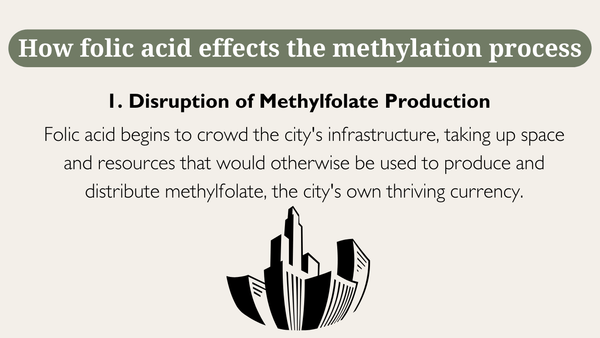
2. Resource Misallocation: As folic acid demands attention, enzymes and transport systems (city workers and their tools) are diverted from their regular tasks to deal with this influx.
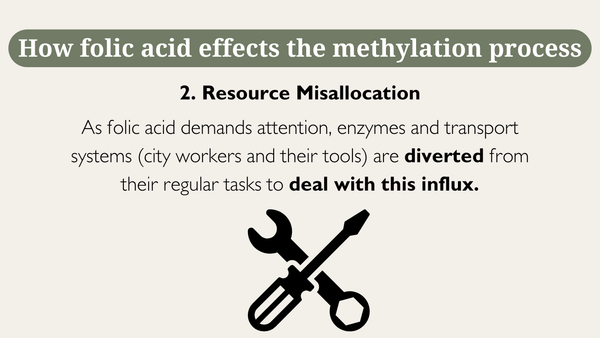
This misallocation can lead to neglect of other critical city functions, illustrating how an overemphasis on processing this foreign currency can detract from the city's essential maintenance and development projects.
This understanding underscores the importance of moderating folic acid intake, ensuring it doesn't overwhelm the system and disrupt the critical methylation process that underpins so many of the city's (body's) vital functions.
In essence, while folic acid has its place in our dietary landscape, understanding its impact on methylation highlights the need for a balanced approach to supplementation, especially for those with MTHFR variations.
Just as a city thrives on the efficient management and flow of resources, our bodies depend on a well-regulated methylation process to maintain health and harmony.
How does folic acid affect those with the MTHFR gene?
Navigating through the complexities of how our bodies process nutrients reveals a critical piece of the puzzle for individuals with the MTHFR gene mutation.
This mutation doesn't just slightly adjust the body's internal workings; it can significantly alter the way folic acid is metabolized, leading to far-reaching consequences on health.
The Enzyme Dilemma:
At the heart of this issue is the MTHFR enzyme's role in converting folic acid into methylfolate, the body's preferred folate form.
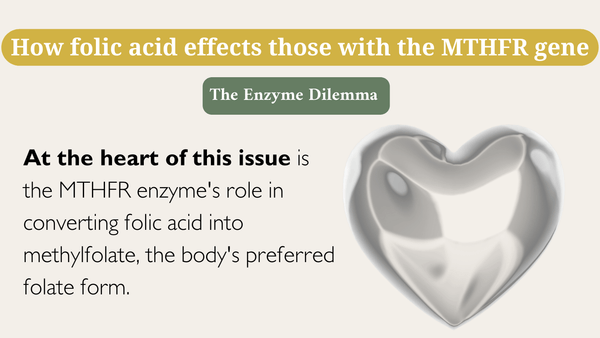
For those with the MTHFR mutation, this conversion process isn't as efficient.
It's like having a key that doesn't quite fit the lock, making it challenging to access the necessary resources for crucial bodily functions such as DNA synthesis, cell repair, and neurotransmitter production.
This inefficiency can lead to a buildup of unmetabolized folic acid, essentially 'stealing' enzymes and transport mechanisms that could be put to better use elsewhere in the body.
Impact on Neurotransmitters and Beyond:
The potential effects of folic acid on neurotransmitters are particularly concerning.
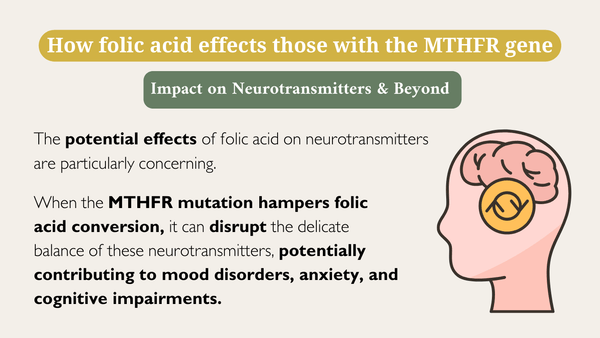
Neurotransmitters are the body's chemical messengers, playing vital roles in regulating mood, behavior, and cognition.
When the MTHFR mutation hampers folic acid conversion, it can disrupt the delicate balance of these neurotransmitters, potentially contributing to mood disorders, anxiety, and cognitive impairments.
Given that neurotransmitter synthesis is intimately linked with folate metabolism, any disruption in this process can ripple through mental, neurological, and even cardiovascular health.
Considering the Research:
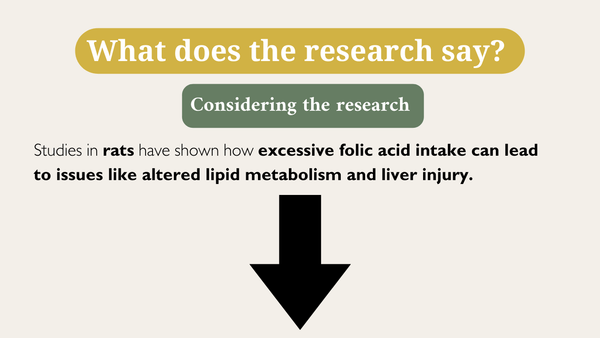
While studies in rats have shown how excessive folic acid intake can lead to issues like altered lipid metabolism and liver injury, it's crucial to ponder the implications for humans.
If rats, with their faster MTHFR processing capabilities, are affected by high folic acid levels, the impact on humans—whose MTHFR activity is generally slower—could be even more significant (research article).
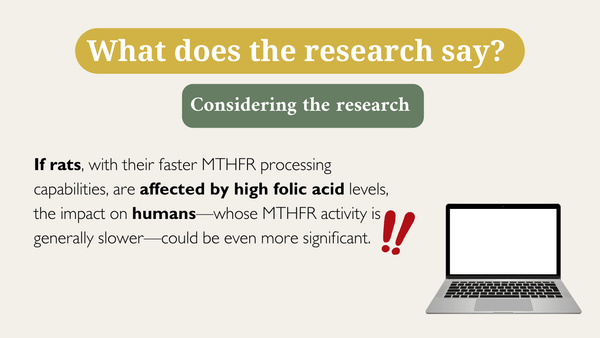
This brings to light the importance of closely monitoring folic acid intake, especially for those with the MTHFR mutation.
MTHFR and Folic Acid: A Delicate Balance:
For individuals with the MTHFR gene mutation, managing folic acid intake becomes a balancing act.
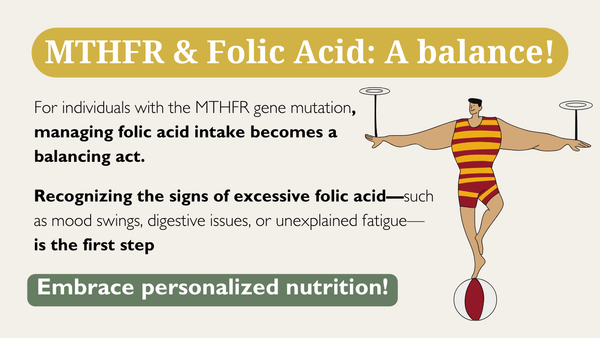
Recognizing the signs of excessive folic acid—such as mood swings, digestive issues, or unexplained fatigue—is the first step.
From there, prioritizing natural sources of folate over synthetic folic acid can help mitigate these effects.
Foods rich in natural folate include leafy green vegetables, legumes, cooked lentils, orange juice, brussel sprouts, and certain citrus fruits, offering a gentler, more effective way for healthy adults to receive the folate content their body needs.
Embracing Personalized Nutrition:
Understanding the interaction between folic acid and the MTHFR gene mutation underscores the need for personalized nutrition strategies.
It highlights that what works for the majority may not suit everyone, especially those with specific genetic predispositions.
By choosing foods and supplements that align with their unique genetic makeup, individuals can support their health more effectively, turning the tide on the challenges posed by the MTHFR mutation.
In summary, the journey to wellness for those with the MTHFR gene mutation involves navigating the complex interplay between genetics and nutrition.
By understanding the nuances of how folic acid affects their bodies and adjusting their diets accordingly, they can take meaningful steps towards achieving balance and well-being.
Why folic acid can lead to bloating and other symptoms
Navigating the complexities of folic acid metabolism, especially for those of us with the MTHFR gene mutation, is a journey marked by discovery and adaptation.
The crux of the matter lies in our body's struggle to process folic acid properly, causing a cascade of effects that can lead to bloating, mood swings, and digestive issues.
This isn't merely about discomfort; it's about recognizing how a seemingly minor metabolic hiccup can profoundly impact our daily lives and overall well-being.
For me, understanding this connection was a pivotal moment.
Initially skeptical, I realized that the frequent bloating and erratic mood swings I experienced weren't just random occurrences but signs of my body's plea for a change.
Embracing a healthy diet that favors natural sources of folate over synthetic folic acid brought noticeable relief and a sense of control over my health.
Lastly, I also want to acknowledge that this can be very difficult to do, especially in the USA as enriched foods are so pervasive, but as stated before, we must be advocates for our own health and make this shift guided by an understanding of our body’s unique needs.
How do you know you possibly have the MTHFR gene mutation ?
To better recognize the signs of an MTHFR gene mutation, it's essential to pay attention to certain symptoms that may elude typical medical explanations.
Here's a more detailed look at these indicators, especially focusing on persistent anxiety:
1. Persistent Anxiety:
- This type of anxiety is characterized by its lifelong, intermittent presence, making it a constant but unpredictable shadow over one's life.
- A distinguishing feature is the difficulty in identifying specific triggers. Unlike situational anxiety, this form feels more like an ever-present allergy, with triggers that are elusive and broad-ranging.
- For many, conventional anti-anxiety medications offer limited relief. Instead of alleviating the underlying tension, these medications often result in a numbed state, described by some as feeling like a "zombie." This lack of efficacy underscores the unique nature of anxiety linked to MTHFR mutations.
2. Impaired Gut Motility:
- Symptoms can include inconsistent bloating unrelated to specific foods, along with intermittent gas, bloating, diarrhea, constipation, and cramping, pointing to a deeper metabolic imbalance.
3. Sleep Disturbance:
- Challenges in falling or staying asleep, often accompanied by an active mind but an exhausted body, further hint at the systemic impact of MTHFR gene mutations.
4. Behavioral Changes in Children:
- Notable behavioral shifts, possibly labeled as ADHD or other behavioral disorders, especially following the consumption of enriched products, suggest a sensitivity that may be tied to this genetic factor.
5. Family History:
- A higher prevalence of MTHFR gene mutations in certain ethnic groups, such as Italians, Hispanics, and Chinese, can also be a clue.
Understanding these signs is a critical step toward considering an MTHFR gene test and exploring supportive interventions, such as supplements with methylfolate, B12, and a B-complex.
These measures can be pivotal in managing health in a more personalized, effective manner.
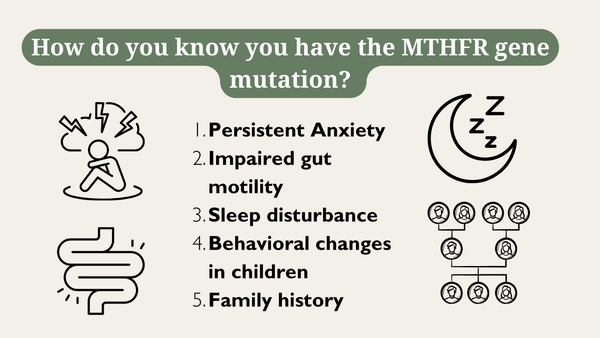
How to combat this?
In navigating the complexities of the MTHFR gene mutation, understanding how to mitigate its impact is crucial.
Here are tailored strategies that not only address the issue head-on but also resonate with the journey you're on.
Remember, these suggestions are starting points—listen to your body, think independently, and consult a healthcare professional for personalized advice.
1. Avoid Folic Acid:
Essential during pregnancy and beyond, avoiding enriched or fortified foods, along with energy drinks, can significantly lessen the enzymatic burden on your body. This step helps protect your natural folate levels by preventing folic acid from hijacking essential enzymes and transporters.
2. Supplement Wisely:
Choose supplements that are free from folic acid. Methylfolate and folinic acid are excellent choices that support your body's natural processes. Emphasize nutrient-dense foods, particularly green leafy vegetables, to harness their full spectrum of benefits, including naturally occurring folate.
3. Consume Raw Vegetables:
Focus on leafy greens and minimally processed foods, like stone-ground wheat, to preserve and consume folate in its most beneficial form. This approach champions the power of whole foods in maintaining optimal health.
4. Support with Riboflavin and Thyroid Health:
These elements are allies in the efficient functioning of the MTHFR enzyme, offering another layer of support in managing this genetic variation.
5. Consult Your Healthcare Provider:
While these strategies are informed and thoughtful, it's crucial to remember they are suggestions, not prescriptions. Collaborate with your healthcare provider to tailor a plan that's right for you.
6. Incorporating B vitamins:
The incorporation of these vitamins particularly through a B-complex supplement, can revolutionize your energy levels and mental clarity.

This "pure energy" effect aligns perfectly with a holistic approach to managing the MTHFR gene mutation. It's not just about avoiding what's harmful; it's also about embracing what fortifies and rejuvenates your body and mind.
Re-emphasizing the importance of avoiding folic acid and fortified foods is crucial.
Its presence can disrupt the natural balance and absorption of folate by monopolizing the enzymes and transporters your body needs. If you want to learn more about fortified pasta check out this blog here!
In the end, by adopting these measures, you're not just combating symptoms; you're actively enhancing your well-being and paving the way for a healthier, more vibrant you!
Individual Differences: Why One Size Does Not Fit All
Our bodies are unique, and the way we metabolize nutrients like folic acid varies from person to person.
This reality underlines the importance of personalized nutrition and health strategies tailored to our genetic predispositions and individual needs.
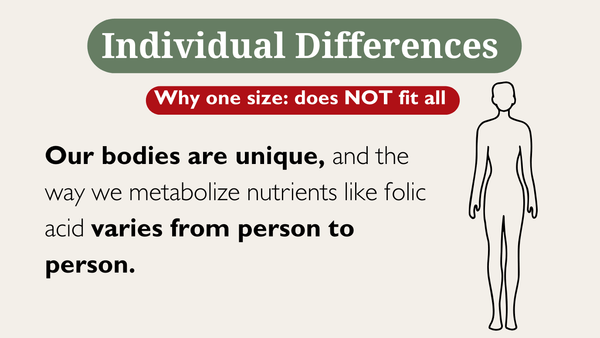
Government mandates have attempted to make food "safe for everyone" through fortification policies intended to prevent nutritional deficiencies on a broad scale.
However, this approach overlooks the vast diversity in individual health needs and genetic makeups, and so do many other approaches for that matter.
Acknowledging these differences is crucial, and it is also of the utmost importance to be an advocate towards your own healthcare as it becomes evidently clear that a one-size-fits-all dietary recommendation does not suit everyone.
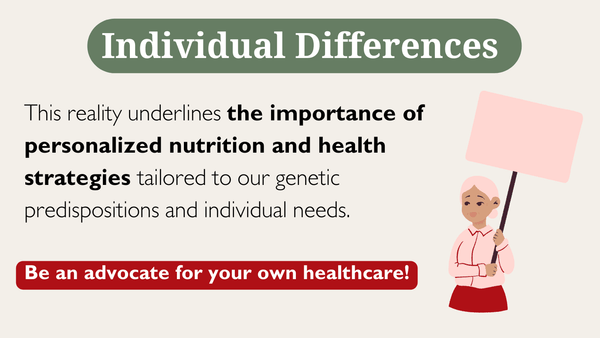
Be proactive and seek out information!
By becoming aware of our unique requirements and potential genetic variations like the MTHFR mutation, we can take control of our health, opting for natural sources of nutrition that best support our well-being.
Finding Non-Enriched, Folic Acid-Free Pasta
When embarking on a journey towards better health and dietary satisfaction, especially for those of us keen on avoiding bloating and aligning our folate intake with our health objectives, the quest for non-enriched, folic acid-free pasta becomes paramount.
Here's how to fine-tune your search and ensure what you're consuming is genuinely conducive to your well-being.
Identifying Folic Acid-Free Pasta:
The first step is to scrutinize labels for any mention of folic acid or enrichment.
Opt for pastas that highlight whole or ancient grains as their core ingredient, and ensure they explicitly state they are free from synthetic additives.
This vigilance is crucial for anyone navigating the MTHFR gene mutation complexities or simply aiming for a more natural dietary approach.
Artisanal, Stone-Ground Ancient Grain Pasta:
Our pasta stands out by preserving the integrity of whole grains, thus delivering the full spectrum of naturally occurring B-complex vitamins.
These aren't just any vitamins; they're the key to unlocking true, pure energy.
The B-complex in our pasta doesn't just fill you up; it invigorates your body and clarifies your mind.
Our pastas are folate rich foods with dietary fibers!
You will be giving your body the naturally occurring B complex it craves while seamlessly avoiding folic acid and embracing a diet rooted in natural nutrients.
A Guide to Organic, Unadulterated Wellness:
Beyond just avoiding folic acid, it's essential to seek out products that pledge a commitment to organic cultivation—free from pesticides, additives, or any synthetic interventions.
Our pasta embodies this ethos, offering a gateway to nutritional integrity reminiscent of a time when food was unblemished by modern processing.
With our artisanal pasta, you're not just eating; you're embarking on a journey to revitalize your energy and mental clarity through the natural potency of B vitamins.
This blend of careful selection and the pursuit of artisanal excellence isn't just about diet—it's about transforming your approach to eating and ensuring every bite supports your journey to health and satisfaction without compromise.

Conclusion
In the journey towards better health and understanding the intricate relationship between our genetics and nutrition, we've navigated the terrain of folic acid and its potential pitfalls for those among us with unique genetic profiles, like the MTHFR mutation.
This exploration isn't just about avoiding discomfort; it's about rediscovering the joy of eating, the energy that comes from truly nourishing foods, and the peace of mind knowing you're feeding your body what it truly needs.
Imagine a table set with foods that don't just taste good but feel good too—where every bite is a step away from the bloating and fatigue induced by modern food processing and a step towards vitality.
You can attain this: by choosing a lifestyle that respects your body's needs, cherishes tradition, and embraces the future of health.
As a step in this direction, we invite you to take actionable steps and explore our website, where you’ll find our unique artisanal pasta – a testament to tradition and nutrition.
We want to go on this journey with you and offer you not just a product, but pasta that will help you become the best and healthiest version of yourself!
Together, let's set a new standard for what it means to eat well, feel well, and live well.
Disclaimer: the content in this blog is for informational purposes only and should not be taken as professional, medical advice.
FAQs
Does all pasta contain folic acid?
Many pastas in the U.S. unfortunately contain folic acid, make sure to always be checking labels.
How can I tell if my pasta has folic acid in it?
Check the nutrition label on your pasta package to see if it lists folic acid among its ingredients or it is said to be enriched.
Is there more folic acid in whole wheat pasta compared to regular pasta?
Whole wheat pasta naturally contains some folic acid, but enriched regular pastas may have added amounts of this nutrient.
Can eating pasta help me get enough folic acid?
Eating enriched flour or fortified pasta can contribute to your daily folic intake of folic acid as part of a balanced diet, but again you need to make sure it is not upsetting your stomach as you could have the MTHFR gene and need a folic acid free pasta.
Should people with certain diets be concerned about the amount of folic acid in pasta?
Yes, individuals following certain diets or with specific health conditions should be mindful of the amount of folic acid in pasta and other fortified foods. These individuals could include: people with the MTHFR gene mutation, individuals with existing health conditions, pregnant women, or people with a history of Vitamin B12 deficiency Make sure to always check food labels to ensure you meet your nutritional needs, including for nutrients like folic acid.
Which pasta doesn’t have folic acid?
Pasta that does not contain folic acid typically includes those made from unenriched, whole or ancient grains, organic, and gluten-free options that do not use enriched wheat as a base. Papa Vince pasta has NO folic acid, and currently there are not many other pastas on the market that offer this!
How much folic acid is in spaghetti?
One serving of enriched wheat spaghetti typically contains 100 mcg (micrograms) of folic acid. This amount can vary based on the brand and the degree of fortification.
References
Folic acid intake from fortification in the United States exceeds predictions. Nutrition. Sep 2002.
Date Accessed: 2/29/2024
Choumenkovitch SF, Selhub J, Wilson PW, Rader JI, Rosenberg IH, Jacques PF. Folic acid intake from fortification in United States exceeds predictions. J Nutr. 2002 Sep;132(9):2792-8. doi: 10.1093/jn/132.9.2792. PMID: 12221247.
Date Accessed : 2/21/2024
Cosín-Tomás M, Luan Y, Leclerc D, Malysheva OV, Lauzon N, Bahous RH, Christensen KE, Caudill MA, Rozen R. Moderate Folic Acid Supplementation in Pregnant Mice Results in Behavioral Alterations in Offspring with Sex-Specific Changes in Methyl Metabolism. Nutrients. 2020 Jun 8;12(6):1716. doi: 10.3390/nu12061716. PMID: 32521649; PMCID: PMC7352339.
Date Accessed 2/23/2024
Christensen KE, Mikael LG, Leung KY, Lévesque N, Deng L, Wu Q, Malysheva OV, Best A, Caudill MA, Greene ND, Rozen R. High folic acid consumption leads to pseudo-MTHFR deficiency, altered lipid metabolism, and liver injury in mice. Am J Clin Nutr. 2015 Mar;101(3):646-58. doi: 10.3945/ajcn.114.086603. Epub 2015 Jan 7. PMID: 25733650; PMCID: PMC4340065.



